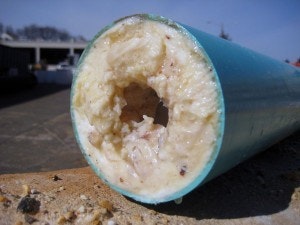FOG

Fats, oils, and grease are not just bad for your arteries and waistline; they’re bad for sewage collection systems too! Sanitary sewer overflows and backups can cause health hazards, damage home interiors, and even threaten the environment.
A common cause of overflows and backups in the raw sewage collection system is a clogged pipe caused by fats, oils, and greases (FOG). The components of FOG get into the sewage collection system from household drains as well as from poorly maintained grease traps/interceptors in restaurants, automotive industries, and other FOG producing businesses. Home garbage disposals do not keep grease out of the plumbing system and or sanitary service line.
To help prevent expensive overflows and backups, plumbing emergencies, and a potential public health issue, the District is asking its customers to follow this list of DO’s and DON’Ts:
DO: Scrape food scraps into the trash, not the sink.
DO: Wipe grease from pots, pans and dishes with dry paper towel before rinsing or washing them.
DO: Use strainers in sink drains to prevent food scraps from entering the sewer system.
DON’T: Put greasy food into the garbage disposal.
DON’T: Use hot water to rinse FOG from the dishes and pots and pans. As the water cools, the FOG will solidify and clog your pipes.
DON’T: Rely on commercial additives in detergents to dissolve grease. They only pass it down the line where it causes problems in other areas.
